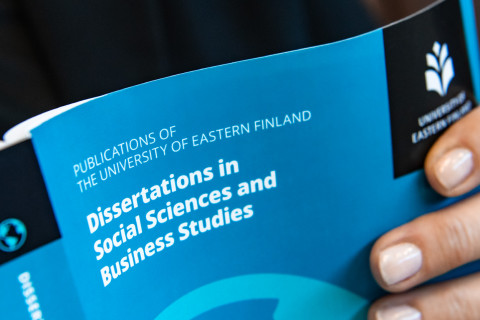The doctoral dissertation of MScOT Alireza Momeni will be examined at the Faculty of Social Sciences and Business Studies on 3 September 2021.
What is the field of study and topic of your doctoral research, Alireza Momeni?
The field of study is social psychology, and the topic of my doctoral research is Re-identification to leave drug addiction, A grounded theory of transforming identity. Addiction as a multi-layered phenomenon can neither be conceptualized as a taken-for-granted biomedical circumstance nor an individual choice. As one of the major public health problems, addiction is inextricably intertwined with certain bio, psycho, and social factors. The literature review shows that the biomedical model of addiction is still the most dominant theoretically and practically in the field. This model focuses on only biological causes in terms of the etiology of addiction, thereby, it treats addiction as a (brain) disease. However, addiction is a realm for multidisciplinary research approach and covers a broad range of outlooks and contexts. A deep understanding of addiction inevitably requires to be examined from different disciplines such as social psychology, which opens up the possibility of treating addiction with a more favorable holistic approach. The current social psychological study attempts to conceptualize the experiences and perspectives of people with addiction. It seeks to understand how addiction shapes the mind and the self and how addiction can influence thought and feeling through social interactions.
What are the key findings of your doctoral research?
The theory of transforming identity (TI) and new relevant concepts emerged from qualitative data gained from the substantive area of addiction. Generally, the theory shows what counts as self and identity may shift over time, location, and health condition. Addiction is a health issue that can be the subject of identity transformation. The theory also suggests that addiction yields a stigmatized identity and acts as a solar eclipse; It can overshadow an individual’s identity. Six major categories were revealed: social portraying, living in a penumbra zone, being rumbled, transforming identity, living in an umbra zone, and re-identification. The current grounded theory used for this study can shed new light on the situated nature of knowledge in addiction with the centrality of identity. The literature shows there is well-established literature on the etiology of substance abuse. An identity-based model (IBM) has already been developed that covers the etiology of drug addiction. However, the scope of this study is experiences of post-occurrence of addiction and thereby focused on the incidents that arose after addiction. Moreover, the identity-based literature concerning living with addiction is an underexplored area. As a new and innovative theory, the theory of TI proposes that one’s identity is ever-changing and that drug use can lead to a significant transformation of identity. The theory yields a possible explanation of the fluidity and dynamicity of the main phases of identity change in addiction including secrecy, revealing, stigmatizing, and re-identification. However, the significance of the role of cultural determinants to the process of changing identity is inevitably subjective. This study also provides a better understanding of the subtle differences between cultures in terms of addiction and the subjective influence of context-related issues such as stigmatization. It highlights the significance of cultural norms and the ways that society affects sufferers.
How can the results of your doctoral research be utilised in practice?
The theory of transforming identity and its relevant concepts yields new possible explanations regarding addiction as well as further study in the field. The theory to some extent ‘helps explain theoretical gaps among theory, research, and practice’ relating the addiction arena in the context. Indeed, the theory can be adopted by practitioners, as it advocates for any methods, techniques, and strategies that healthcare professionals can use to address sufferers’ identity shifts. It is also theoretically valuable for developing several therapeutic options, such as the Identity-Oriented Intervention Program. Therefore, it is possible to begin to be somewhat optimistic that new solutions to the problem of addiction are on the horizon.
What are the key research methods and materials used in your doctoral research?
A grounded theory method was employed, using in-depth interviewing with a purposive sample (17 male) of currently abstinent drug abusers from the three rehabilitation centres in Tehran. Using the constant comparative strategy within ATLAS software for data analysis.
Is there anything else you would like to tell about your doctoral research?
This study has not solely been an academic exercise. Rather, it has sought to address the real concerns of the participants. It provides an opportunity to cultivate a new level of openness that encourages participants to share their experiences and encourages them to expand their responses. This openness may lead to the development of treatment ideas not yet considered.
The doctoral dissertation of MScOT Alireza Momeni, entitled Re-identification to leave drug addiction, A grounded theory of transforming identity, will be examined at the Faculty of Social Sciences and Business Studies on 3 September at noon. The opponent in the public examination will be Docent, Research Director Matilda Hellman of the University of Helsinki, and the custos will be Professor Emerita Vilma Hänninen of the University of Eastern Finland. Language of the dissertation event is English. Public examination will be streamed live.
For further information, please contact:
Alireza Momeni, [email protected], tel. +358 44 916 5090
